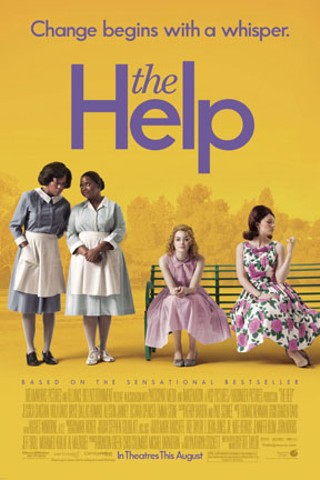The Help is a work of fiction, though it strikes a very real note about racial inequalities in the Deep South at the dawn of the Civil Rights Era.
Given the major sacrifices that so many people made to raise awareness of the plight of blacks in the age of segregation, the story told here doesn't sound truly unique or, in fact, any less plausible than what we already know is true.
The title of the film, and of Kathryn Stockett's wildly successful novel, could have two meanings. The more-traditional interpretation is the nameless collective of poor, undereducated servants cooking, cleaning and raising children for rich crackers who couldn't be bothered to do it themselves. This is presented almost as a more-genteel form of slavery; one woman comments that she was left in an employer's will, as a piece of property, passed down the line within the family.
The other meaning of the title could be the assistance that a generation of servants received in the early 1960s from a well-meaning young white journalist, who encouraged and helped them to tell their stories.
It might seem like this is a good recipe for melodrama, but The Help doesn't stoop to that. The conclusions are not absolute, and the victories are hard-won. This is another examination of a time that remains hard to fathom and is undeniably relevant. The film is driven not so much by the actions in any scene—but by the convictions of its actors. It is, for a non-awards-season studio film about a weighty social subject, tremendously well-acted, top to bottom.
The Help is narrated sporadically by Aibileen (Viola Davis), who reveals early on that she left school at 14 to help her mother earn money for the family. Over the years, her specialty became caring for the toddlers of Jackson, Miss. Currently in her care is Mae Mobley Leefolt, and not a day goes by when Aibileen doesn't remind the child, "You is kind; you is smart; you is important." It's a lot more than her mother ever tells her.
Aibileen is approached at a society party by Skeeter (Emma Stone), who sticks out like a sore thumb among the other young white women in Jackson. She's happily single; she doesn't Aqua Net her hair to high heaven; and she thinks for herself. Skeeter writes for a local paper but has designs on something greater, which is why she asks Aibileen if she could tell the story of the South from the perspective of the servants.
There is, at first, great resistance. If these stories got out, the servants might never work again. But eventually, there are enough reasons for Aibileen to come forward. She's joined by the outspoken Minny (a terrific Octavia Spencer) and about a dozen others.
For good or bad, it is efficient in movies like this to present a one-dimensional villain. As Jackson society queen Hilly Holbrook, Bryce Dallas Howard plays her one note over and over again—cold, uncaring, deluded. Thankfully, the trick for Howard comes from actually finding ways to imbue her performance so that she doesn't devolve into some monolithic personification of racism.
Hers is but one of several integral performances in the film, all of which are so good that there's no point in even mentioning Sissy Spacek or Allison Janney. Emma Stone keeps getting better and better, with less comedy here than we're used to seeing from her, though there is some. Nearing 80, Cicely Tyson is unforgettable in a handful of heartbreaking scenes. And then there is Viola Davis, who earned an Oscar nomination for a few pages of dialogue in Doubt, and absolutely drives off with The Help. That's probably by design. She brings a quiet dignity and fortitude to Aibileen, a woman with one chance left.
There are some powerful lessons in The Help, not the least of which is this: Hire good actors.











